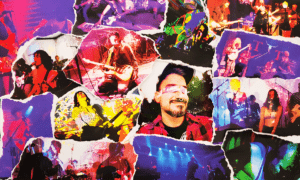Ukrainian band Kalush Orchestra captivated the audience with their performance of their song “Stefania” on Eurovision 2022. Saturday, May 14, Ukraine became the winner of the international song contest with 631 points. Spectators from Europe and participating countries gave 439 votes to Ukrainian artists, and 192 came from the contest jury. The highest score of 12 points was given to Ukraine by Poland, Moldova, Romania, Lithuania, and Latvia. These neighboring countries serve as some of the biggest humanitarian shelters for Ukrainian refugees, with Poland and Moldova concerned about possible Russian incursions on their territory.
What is the Eurovision contest, and why does it matter for Europe?
The foundation of the Eurovision contest stems from the motto of uniting the European countries and promoting cooperation between artists in neighboring countries after the Second World War. The first contest was held in Switzerland in 1956, where only seven countries participated, and the winner was announced behind closed doors, chosen by contest juries. Change came in 1957, inspired by the BBC’s Festival of British Popular Songs, public voting, and the scoreboard in Eurovision was adopted.
Today, Eurovision is one of the most significant and most-viewed annual non-sports events in over 50 countries. It is not only countries located in the Eurasia region that can participate and represent their country. In fact, Australia has become a non-EBU member country and has remained in the top 10 since 2015.
One of the Eurovision missions is to bring music from different countries together, while keeping politics out of the contest. Eurovision representatives warn and mandate the artists not to use the stage of Eurovision for their political agendas. In his interview with Billboard, Martin Österdahl, Executive Supervisor of Eurovision, says, “[Eurovision] is about unity around values, not division through politics.” However, this year it was not the case. In February, on his Twitter page, Österdahl shared a letter from the European Broadcasting Union, announcing the decision to ban Russia from competing in Eurovision 2022 following the invasion of Ukraine.
Why Kalush Orchestra and the song “Stefania”?
Kalush Orchestra became the third contender to bring Ukraine victory in the Eurovision contest, along with Ruslana Made, who sealed her victory in 2004 with her song “Wild Dances,” and in 2016, Jamala triumphed with a penetrating hit “1944.”
The main thing that touches Kalush Orchestra is the performance of Oleg Psyuk, which is very easy to recognize: the combination of Kalush phonetics with expeditious speed rap reading. It is almost impossible for a Ukrainian native speaker to decipher the words, but it is fascinating. The combination of folk, rap, percussive sounds, and Sopilka, a Ukrainian folk instrument, make the song engaging and appealing to those who do not understand the lyrics in Ukrainian.
The song “Stefania” honors the mother of the band leader, Stefania Psyuk. Oleg Psyuk said he had never dedicated a song to his mother before, and would not call their relationship close. However, the musician believes that his mother deserves this song, and he would like to sing it in the finale. After the start of a full-scale war, “Stefania” acquired new meaning, though the text does not include the theme of war. Many people began to perceive the song as “Ukraine is my mother,” or miss their mothers, and so the song became very popular. And now, we can say, in the hearts of many Ukrainians. And many people call it a song of our war. “Like an anthem,” says band leader Oleg Psyuk.


After the final performance at Eurovision, Stefania, the mother of Oleg, said that she was not only proud of her son for representing Ukraine in the song contest, but more importantly, she was proud of her son for calling out from the stage to help Mariupol and all those at the Azovstal plant.

During the live stream of Eurovision, despite a potential disqualification for violating the political messages mandate, the front man of the Kalush Orchestra shouted to the audience, “I ask all of you, please help Ukraine, Mariupol. Help Azovstal, right now!”

This move forced a lot of broadcast viewers to pick up their cell phones to look up “Mariupol” and “Azovstal.” In this manner, Kalush Orchestra helped increase people’s awareness worldwide, and reminded them about the atrocities happening at the Mariupol steel plant.
Today, the military of Ukraine is blocked by Russian troops on the territory of the Azovstal plant. They are running out of food, water, weapons, and medical supplies. The goal of talking publicly about Azovstal is to call out the foreign government to help with the extraction procedure to withdraw the Ukrainian army from Mariupol’s hostile environment, transporting them to an area occupied or controlled by friendly personnel.



A few hours later, after the powerful message made by Kalush Orchestra to evacuate Ukrainian armed forces, Russian forces shared the image on social media of the OFAB 250-270 bombs with a written message addressed to Kalush Orchestra, “Just as you asked for, Kalusha! For Azovstal.” Shortly after, in response to the victory of the Kalush Orchestra, President Zelensky stated that the following year’s Eurovision would be held and welcome foreign artists to Mariupol.

Despite ongoing debates about whether the Ukrainian band should have been disqualified for violating the apolitical norms of Eurovision, the song “Stefania” has become the first glimpse of sunlight during a devastating 80 days of war. Winning the contest did not foster a sense of pride for Ukrainians; instead, it brought hope, and voiced the bravery and price it takes in Ukraine to fight for freedom.
Author

Veronika is a student from Seattle Central College, an International Student Ambassador, and a member of the Editorial Board of Seattle Collegian. She loves to cook Ukrainian dumplings, travel in the Pacific states, read E.Hemingway, listen to The Rolling Stones and Led Zeppelin. Veronika is pursuing her degree in web development. Her goal is to own her own business and financially contribute to Seattle Colleges Foundations to support low-income international students. While being a member of Seattle Collegian, Veronika is eager to share her own experience of living, visiting, working, and studying in foreign countries.







Be First to Comment